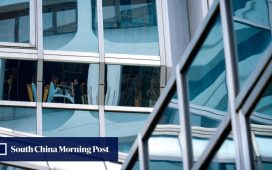“Our Central retail portfolio is a global, brand-defining destination and we are seeing several of our tenants eyeing expansion and innovation. We will be announcing exciting plans to innovate and optimise retail space in the Central portfolio in the first quarter of 2024.”
The developer has seen a 15 per cent increase in footfall in 2023 compared with 2022, while Christmas promotions are tipped to boost sales by 20 per cent during the festive period, Li added.
“One example of the city’s enduring status as one of the most important luxury and lifestyle markets in the world is our exciting partnership with Sotheby’s, which will see them open a state-of-the-art immersive exhibition and retail space in Chater House in the first quarter of 2024,” Li said. “We look forward to sharing more on Sotheby’s new maison early next year.”
French fashion house Chanel has committed to a portion of the retail podium at Capitol Centre in Causeway Bay. Recently Fendi, an Italian luxury fashion brand, opened a new boutique at Harbour City on Canton Road, according to Oliver Tong, JLL Hong Kong’s head of retail.
“Given Hong Kong’s unique draws, such as a low tax environment, a diverse population and its reputation as a prime international shopping destination, the city has always been and will remain an important location for luxury brands,” said Tong.
“The rising demand for luxury brands, and other brands, will have a positive impact on rent, especially in core locations where supply is highly limited in the short to medium term.”
Watch brands like Tissot, Breguet and Omega have leased spaces in 2023. Tissot recently leased a basket of ground-to-second-floor shop units at Mirador Mansion in Tsim Sha Tsui.
Breguet, part of the Swatch Group, leased a ground floor shop in the Central Building in Central. Omega committed to a ground-to-third floor shop unit in Canton House in Central as its flagship store in Hong Kong, according to JLL.
The Macallan opened its global flagship store on the second and third floor of the Hing Wai Building in Central.
As of October, luxury retail sales in Hong Kong had only reached HK$50 billion (US$6.4 billion) this year, significantly lower than the HK$85 billion for the whole of 2018, before the city was brought to its knees by civil unrest followed by the Covid-19 pandemic.
“One of the contributing factors is that mainland visitors have been spending less on luxury shopping and more on exploring cultural and art experiences,” said Mak.
“Additionally, the local economy in Hong Kong is currently weak, leading to reduced spending on luxury goods by local residents as well … Therefore, we are cautiously optimistic about the performance of the luxury retail sector in 2024.”
Luxury brands that are expanding in the city “are interested in opening new flagships stores”, Mak said.
Aussie Grill, an offshoot of the Outback Steakhouse, has announced its exit from the city at the end of 2023. It opened its first outlet at Metroplaza in Kwai Fong in 2019, followed by a flagship restaurant at Entertainment Ground in Central, occupying 4,600-square-foot space.

Retail rents in Hong Kong’s high-street shopping districts such as Central, Causeway Bay and Tsim Sha Tsui are likely to have increased by between 5.3 per cent and 9.7 per cent in 2023 compared with the previous year, according to Cushman & Wakefield. They remain 38 per cent to 47 per cent below their pre-pandemic 2019 levels, however, data compiled by Cushman showed.
In the first six months of 2024, rents will rise between 2 per cent and 7 per cent, the property consultancy forecasts.
“We anticipate the luxury retail market will experience stability but also face significant challenges,” Mak of Knight Frank said.
“Shenzhen’s [growing reputation for] duty-free shopping for international travellers, including Hong Kong and Macau residents, adds to the complexity. This development poses tough competition for the Hong Kong market, considering the larger number of shopping centres and their scale in Shenzhen compared to Hong Kong.
“Over the next 12 to 24 months, we do not expect luxury brands to expand rapidly, because of lower demand from mainland shoppers and the increased competition from Shenzhen.
“As a result, retail rents in Hong Kong are likely to stabilise without experiencing significant upwards increments.”







